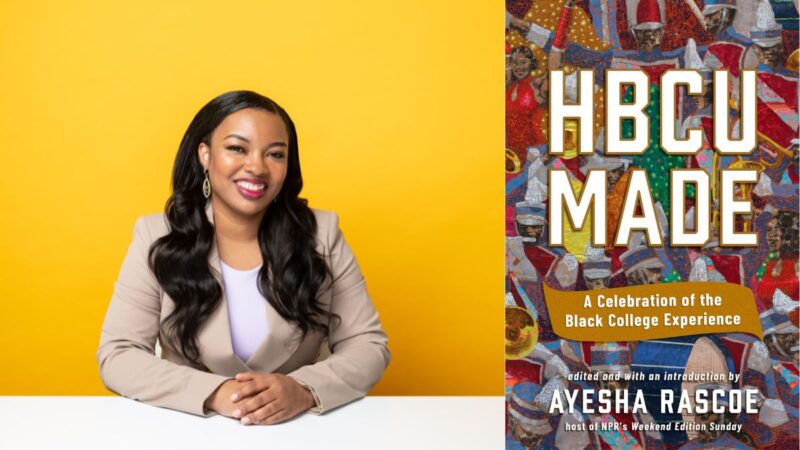What’s special about historically Black colleges and universities
What do Oprah Winfrey, Roy Wood Jr. and Stacey Abrams have in common? They all received diplomas from historically Black colleges or universities. They’re also 3 contributing writers for NPR Weekend Edition Sunday host Ayesha Rascoe’s new essay collection. It’s called HBCU Made: A Celebration of the Black College Experience.
WBHM’s Kelsey Shelton sat down with Rascoe to find out why she felt the HBCU experience needed more recognition.
You kind of touch on it in your introduction but, what exactly made you want to go to an HBCU?
I wasn’t like one of those people who’s like, I have to go to an HBCU, but I was open to Howard because it was out of state, and it just sounded like it was just a really cool place. It was the basis of Hillman College in A Different World, that show, that was so instrumental in my life and so many others. And when I went to visit, I saw all these beautiful black people on the yard, and I saw the Deltas strolling and everyone out and about, even though it was like a kind of drizzly, rainy day, I just felt like I wanted it to be home.
How did you go about picking the essays for this essay collection?
I wanted a wide range of people from different backgrounds, different generations, schools represented. I didn’t just want the big names like Howard and Morehouse and Spelman. I wanted some of the smaller schools, like, say, a Morgan State or Dillard or Talladega.
And Alabama is very grateful for the representation.
Yes!
In your introduction, you talked about you wanted to be a journalist at Howard. But you felt pushback when you talked about negative things that were going on at Howard. As a black woman myself, I understand that discomfort. So how do you manage your identity as a black woman versus your role as a journalist?
Yeah! And I don’t try to separate the two because I feel like as journalists, we should bring our full selves to the work that we do, and I feel like the work is better for it. But I do feel like when it comes to reporting on issues affecting Black people or Black schools or institutions, I feel like what you can do is you can provide the context, maybe the history, maybe there’s been systematic discrimination or all sorts of things. But I do think that you should always – whatever you love or care about – I feel like to love something is to hold it accountable, and to seek for it to be the best that it can be. And so that’s what I tried to do. And that’s what I really learned at Howard was, yes, this is an institution I love, but this is also an institution that I respect enough and honor enough to push it to be everything that it can be.
Was that a difficult kind of irony to deal with? This place that’s supposed to uplift black voices was kind of hesitant to do so. Was that a hard lesson to learn?
It was a hard lesson to learn. And I think being in school and being young, I think I probably took a lot of it very personally, and felt like I’m just trying to do my job. I’m just trying to be a journalist. But I understand more now that they are looking at it from the perspective of their job is to protect. And my job as a journalist, like it’s just natural conflict. And conflict isn’t necessarily a bad thing, like sometimes conflict is necessary to bring about the truth. But at the time, yeah, it would hurt my feelings, but I’ve grown from that.
And on a more positive note, what was it about your experience that made you want to document yours and others who went to HBCUs in a book?
I mean, and that’s the thing is, like my time at Howard, shaped me. I was able to learn and to grow, right? I was able to grow as a journalist. Because as a journalist, it doesn’t stop. The conflict doesn’t stop. You have to be able to stand your ground and say, this is what I’m going to do. Those seeds were planted at Howard.
Was there anything that surprised you or that you learned from reading the other writers’ stories or essays?
Getting all of these essays from all sorts of people, from Oprah Winfrey to Branford Marsalis to Stacey Abrams, Roy Wood Jr., what I saw over and over again in these stories was just the rich depth of community, in so many different ways, that all of these HBCUs had. Whether it was Roy Wood Jr., who actually got in trouble when he was at FAMU, and then it was FAMU that gave him a second chance. Or, with Oprah Winfrey, she got offered her first job when she was at Tennessee State, and it was a professor at Tennessee State who convinced her father to let her take the job. So, then she takes the job, and obviously the rest is history. It’s not just you’re a student in a class, but you’re really a part of, really almost like a family.
Lena Dunham isn’t trying to reinvent the rom-com. That’s why ‘Too Much’ works
The new Netflix series stars Megan Stalter (also Kayla on Hacks) as a 30-something who moves to London after a breakup.
‘We all want to be Superman; Superman wants to be us,’ says James Gunn
Morning Edition host A Martínez asks writer/director James Gunn, the man behind the reimagining of the entire DC Comics universe for the screen, about his vision for Superman.
South Korean court approves new arrest of former President Yoon Suk Yeol
A South Korean court approved the new arrest of former President Yoon on charges related to his imposition of martial law in December. Yoon's lawyers had described the arrest request as excessive.
31 workers reach safety after partial collapse of Los Angeles industrial tunnel
Construction workers inside a huge industrial tunnel in Los Angeles made it to safety after a portion of it collapsed Wednesday evening, an outcome officials called a blessing.
U.S. issues sanctions against United Nations investigator probing abuses in Gaza
The State Department's decision to impose sanctions on Francesca Albanese, the U.N. special rapporteur for the West Bank and Gaza, follows an unsuccessful campaign to force her removal.
New data reveals FEMA missed major flood risks at Camp Mystic
The data also highlights critical risks in other areas along the Guadalupe River in Kerr County, revealing more than twice as many Americans live in flood prone areas than FEMA's maps show.








